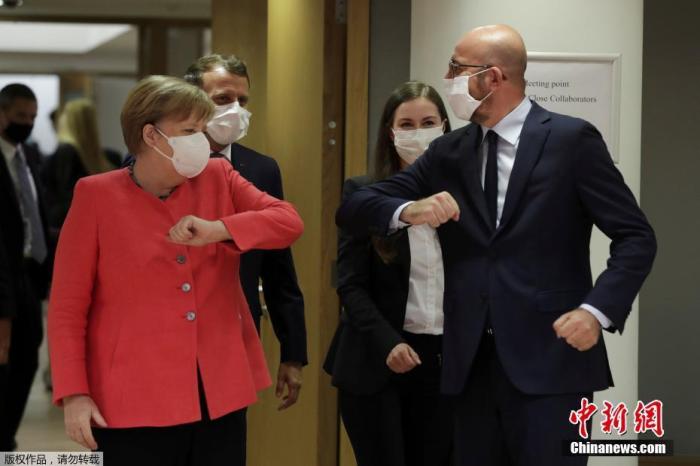Chinanews.com, November 23, a comprehensive report, as of November 22, 2020, German Chancellor Merkel has been in charge of the major European economy for 15 years and has become Germany's "super-long standby chancellor".
Agence France-Presse pointed out that if she completes her fourth term, her ruling record will be equal to that of former Prime Minister Kohl.
Earlier, Merkel had stated that she would resign as prime minister when her term of office expires in 2021.
Data map: On May 18, 2020, the 73rd World Health Assembly held its opening ceremony in the form of a video conference.
The picture shows the remote speech by German Chancellor Merkel taken in Berlin, Germany.
Photo by China News Agency reporter Peng Dawei
On the 22nd local time, European Central Bank President Lagarde called Merkel "a rock in the waves of anger and a role model for women around the world" on social media. She said: "In the current challenging period, Chancellor Merkel Always committed to making Europe stronger and one of the most respected leaders in the world."
At the same time, former French Prime Minister Jean Marc Airault commented that Merkel is the best interpreter of "German quality": "Very rigorous, but it can also be annoying, because sometimes the decision-making is too slow."
Fifteen years ago, Merkel first became Chancellor in November 2005, becoming the first female Chancellor to lead Germany.
Subsequently, she was re-elected three times in October 2009, December 2013 and March 2018. The current term will end in 2021.
Since November 9, 1989, when the 35-year-old Merkel joined politics, she has served as the former deputy spokesperson of the East German government, minister of post-unification Germany and chairman of the opposition party, and was elected the first female chancellor in German history in 2005. .
Merkel steadily fought steadily all the way to the center of power in Germany and even Europe.
During her tenure, Merkel achieved tangible results: when the economic crisis swept the world, she led Germany to bear the impact and put the economy on the fast track of growth; during the European debt crisis, she played the role of European steward and led the rescue.
For this reason, Merkel ranked second in the Forbes list of the most powerful people in the world in 2015; as of the latest issue of Forbes magazine, Merkel has been ranked as the most influential person in the world for 9 consecutive years Women's top...
Data map: On July 17, 2020, local time, in Brussels, Belgium, politicians from various countries attending the face-to-face summit of the European Union "bumped" and greeted each other.
The picture shows German Chancellor Merkel (left) and European Council President Michel (right) "bumping" greetings.
However, she also experienced several difficult challenges and even crises during her time at the helm.
In 2015, Merkel decided to adopt an open policy to millions of immigrants who flee the war in Syria and Iraq. While gaining partial recognition, it also brought German society issues such as cultural "conflicts" and security loopholes.
In addition, the radical right has entered parliament and entered different levels of government through strong votes, posing challenges to its governance.
Since the outbreak of the new crown epidemic, Merkel, as the prime minister of a country, has responded well to the public health crisis, and has received widespread attention due to the low mortality rate in Germany and the timely response of the government.
The poll support rate of the center-right coalition led by her is also climbing.
Some media pointed out that public opinion now supports Merkel's re-election in the 2021 autumn general election and will serve as prime minister for the fifth time.
Earlier in May 2020, Interior Minister Seehofer stated that he frequently heard discussions about Merkel's fifth term.
However, in an interview with German TV channel ZDF on June 4, Merkel refuted this claim and said that she would not stand for election again.

